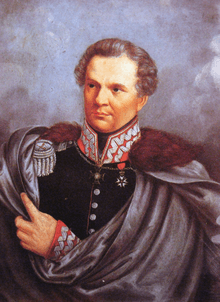Jan Zygmunt Skrzynecki
Jan Zygmunt Skrzynecki (1787-1860) was a Polish general, Commander-in-Chief of the November Uprising (1830-1831).
Jan Zygmunt Skrzynecki | |
|---|---|
 | |
| Born | 8 February 1787 |
| Died | 1 December 1860 (aged 73) |
Biography
He was born in Żebrak, Siedlce County in 1787. After completing his education at the Lwów University, he entered the Polish Legion formed in the Duchy of Warsaw, as a common soldier and won his lieutenancy at the Battle of Raszyn in 1809. At the Battle of Leipzig he greatly distinguished himself and at Arcis-sur-Aube, in 1814, saved Napoleon from the sudden onslaught of the enemy by sheltering him in the midst of his battalion.
On the formation of the Kingdom of Poland in 1815 Skrzynecki was put in command of five infantry regiments of the line, and on joining the insurrection of 1830 was entrusted with the organization of the Polish army. After the Battle of Grochow, he superseded Prince Michał Gedeon Radziwiłł as commander in chief; but avoided all decisive operations as he hoped for the pacific intervention of the European powers in favor of Poland.
In the beginning of March 1831 he even entered into correspondence with the Russian Field-marshal Hans Karl von Diebitsch, who was taken very ill both at Paris and London. When, at last Skrzynecki had to take the offensive his opportunity was gone, and he committed more than one tactical blunder. In the battle of Ostrołęka (26 May 1831) he showed his usual valour and considerable ability, but after a bloody contest Diebitsch prevailed and Skrzynecki fell back upon Warsaw, where he demanded a reconstruction of the government and his own appointment as dictator. To this the Diet would not consent, though it gave Skrzynecki a vote of confidence. But public opinion was now running strongly against him and he was forced on 10 August, in his camp at Bolimów, to place his resignation in the hands of his successor, Henryk Dembiński. Skrzynecki thereupon joined a guerrilla corps and on 22 September took refuge in Austrian territory. Subsequently he resided at Prague, but migrated to Brussels where he was made commander in chief of the Belgian army, an appointment he was forced to resign by the combined and emphatic protest of Russia, Austria and Prussia, in 1839; however he rested there in active service until 1848. With the permission of the Austrian government he finally settled at Kraków, where he died in 1860.
Polish historian, Jerzy Łojek, presumed that Skrzynecki was a traitor who baffled all the national efforts.[1]
Although Skrzynecki was remarkable for his personal courage (albeit some accused him of cowardice) and made an excellent general of division, he was unequal to the heavier responsibility of supreme command, and did much harm in that capacity by his irresolution. He wrote Two Victorious Days (Warsaw, 1831); and Mes erreurs (Paris, 1835).
Honours and awards
- Golden Cross of the Virtuti Militari (1809)
- Knight's Cross of the Virtuti Militari (1812)
- Knight of the Legion of Honour (1813)
- Officier of the Legion of Honour (1814)
- Order of St. Anna, class II (1829)
- Commander's Cross of the Virtuti Militari (1831)
Notes
- Łojek, Jerzy (1986). Szanse powstania listopadowego. Warszawa: Instytut Wydawniczy PAX. pp. 69–79.
References
- Żaliński, Henryk (1998). "Skrzynecki Jan Zygmunt". Polski Słownik Biograficzny. XXXVIII. Polish Academy of Learning. pp. 442–448. ISBN 83-86301-55-4.CS1 maint: ref=harv (link)
- Attribution
